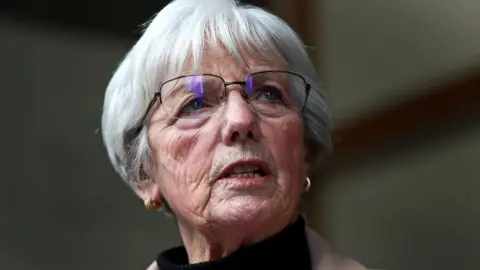Helen's Law: Killers could still be freed despite new law
 PA Media
PA MediaKillers who refuse to reveal where they hid a body could still be freed despite new laws aimed at denying them parole.
Parole Board chief executive Martin Jones said even when Helen's Law starts next year the board was obliged to free inmates who pose no risk to the public.
Helen's Law is named after Helen McCourt, from Merseyside, whose killer Ian Simms was freed from jail without disclosing the location of her remains.
Her mother Marie McCourt said the law could have "gone further".
Mr Jones said prisoners would be questioned and failure to co-operate may not work in their favour.
But he said it was a "really difficult area" and the legislation does not simply mean "no body, no parole".
Failure to co-operate and reveal such information is "frowned upon" by the board and could see a prisoner having requests for parole denied in the first instance, Mr Jones said.
However, he added: "What it cannot do is act as a complete block on your release.
"Ultimately if someone is no longer a risk, we must release them."
 PA Media
PA MediaHelen McCourt, a 22-year-old insurance clerk, vanished on her way home from work in 1988. Her body has never been found.
Her killer Ian Simms was released from prison earlier this year after Mrs McCourt lost a legal bid to keep him behind bars.
Mrs McCourt, 77, from St Helens, said Mr Jones's comments had "belittled Helen's Law".
She said it was "upsetting to hear the law may not have helped our case" and that it was "a very cruel time to put something like that in the papers", causing her "great distress."
She added: "Simms has a violent history. How can they say a man like that - who also won't reveal information - is safe to be released?
"But they have to make sure Helen's Law makes it harder and makes it far more difficult than it has been."
Mrs McCourt said: "I acknowledge this is not a 'no body, no parole law'… I respect people's lives."
But to conceal where victims' remains are located is "an offence against humanity" and "every family should have a chance to say a last goodbye", she added.
The timing of Mr Jones's comments "just days before Christmas, is hugely insensitive to victims [and] has deeply upset Marie McCourt and many families", said her MP, Conor McGinn.
The Labour representative for St Helen's North wrote in a Tweet: "The will of Parliament on Helen's Law is clear [and] so is the duty of the Parole Board."
Ms McCourt's family spent five years calling for legislation to help give grieving relatives closure.
The Prisoners (Disclosure Of Information About Victims) Bill finally gained Royal Assent last month after a series of political and constitutional setbacks.
The law sets out to toughen up existing guidelines, making it a legal requirement for the Parole Board to take into account a killer's failure to disclose the location of their victim's remains when considering them for release.
It will also apply to paedophiles who refuse to identify those they abused.
